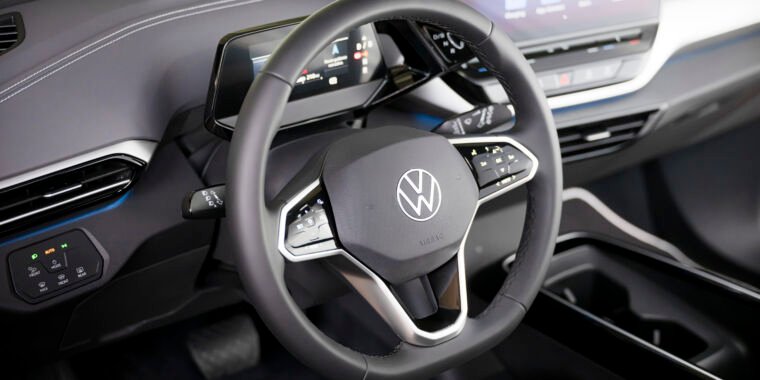Volkswagen
Of all the recent trends in automotive technology and design, the adoption of capacitive controls over mechanical switches and buttons—particularly on multifunction steering wheels—is among the most deplorable. One can see the appeal to the designer—slick-looking fiat panels trump dust-attracting seams, for starters. The bean counters love them, too—it takes less time to install the subassemblies, and that means a little more profit per car. It’s just that they suck. And now, some Volkswagen drivers say capacitive buttons are to blame for their car crashes.
Capacitive buttons require only the lightest of touches to register a button push. That’s mostly a positive thing for buttons on the center console, but when those controls are on bits of trim you might touch by accident, you can run into problems.
For example, capacitive buttons are sometimes put on the spokes of a multifunction steering wheel, as in the image above. In some maneuvers—parking, for example—it’s possible to brush either one of the panels of buttons with a palm. If it’s the spoke on the right side, an accidental touch will just mess with the audio system, which is annoying and perhaps a bit distracting.
But the left side spoke operates the adaptive cruise control system, and mistakenly brushing against the “resume” button could re-engage cruise control to whatever speed it was last set, causing the car to accelerate when the driver didn’t actually want that to happen. And that’s exactly what a number of owners—one of whom reached out to us—suspect is to blame for a spate of crashes affecting the VW ID.4.
Many of the incidents occurred when drivers were parking, so most of the crashes happened at relatively low speeds, but three of the 13 National Highway Traffic Safety Administration crash reports that Ars reviewed involved injuries to the occupant(s). In at least one case that Ars knows of, the car’s black box did not register an accident and the airbags did not deploy, presumably due to the lower speeds involved. The ID.4 sustained several thousands of dollars of damage to the battery pack.
In addition to reporting the incidents to NHTSA, ID.4 owners have been sharing information online, but as is often true in cases of unintended acceleration, they have been greeted with as much skepticism as sympathy. And while there are multiple reports in NHTSA’s database, the agency has yet to open an investigation into the matter.
We reached out to VW to ask if it was aware of the problem, and if so, whether a fix is in the works. The company told Ars, “We are aware of a small number of complaints.”
Time for a new wheel
However, shortly before the first ID.4 unintended acceleration event was reported, VW had publicly repudiated the capacitive multifunction wheel. In October 2022, the head of VW Passenger Cars Thomas Schäfer announced that due to overwhelming customer feedback, “we are bringing back the push-button steering wheel! That’s what customers want from VW,” he wrote.
That hasn’t happened yet; as you’ll be able to read in a review later this week, Ars just tested a model-year 2024 ID.4 that still uses the capacitive design.
Source link
